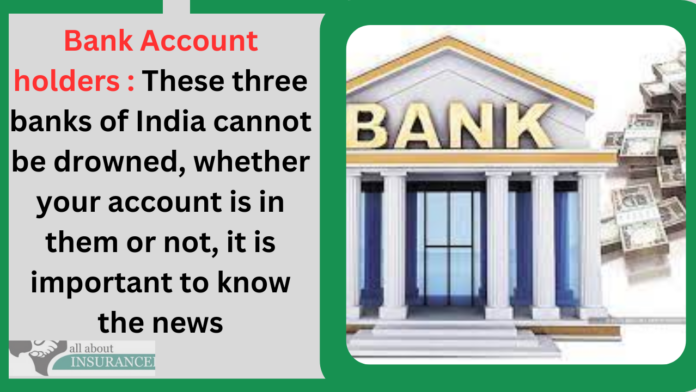India’s three banks SBI, ICICI and HDFC are such banks which are very important for the economy of India. The government cannot afford the drowning of these banks. RBI keeps these banks in the D-SIB list, and strict regulations have been made for them.
New Delhi. India’s three banks SBI, ICICI and HDFC are such banks which are very important for the economy of India. The government cannot afford the drowning of these banks. RBI keeps these banks in the D-SIB list, and strict regulations have been made for them.
In the last one week, two banks of America, Silicon Valley Bank and Signature Bank have sunk. The third bank i.e. First Republic Bank has been saved by other big banks by giving $ 30 billion help. Although the sinking of American banks will not have any effect on India’s banking system, but this incident of sinking of banks one after the other has increased the concern of the people.
People are worried about what will happen to their money if their bank ever fails? If this happens, the government gives an insurance cover of up to five lakh rupees. But do you know that there are three banks in India which are so big that they cannot drown. Such banks are called D-SIBs. RBI has considered ICICI Bank, SBI and HDFC Bank as D-SIBs.
What are D-SIBs?
In technical terms, Domestic Systemically Important Bank. It means those banks which are so important for the country’s economy that the government cannot afford to drown them. Because the country’s economy can get disturbed due to their drowning. Because of which a situation of economic crisis and panic can be created. In English, too big to fail phrase is used for such banks.
The system of declaring banks as D-SIBs started after the 2008 economic downturn. Then many big banks of many countries were drowned, due to which the situation of economic crisis remained for a long time. From 2015, RBI brings out the list of D-SIBs every year. Only SBI and ICICI Bank were D-SIBs in 2015 and 2016. HDFC was also included in this list from 2017.
How are D-SIBs selected?
RBI gives Systematic Importance Score to all the banks of the country on the basis of their performance, their customer base. For a bank to be listed as a D-SIB, its assets must be more than 2 percent of the national GDP. D-SIBs are kept in five different buckets depending on the importance of the bank.
Bucket five means the most important bank, while bucket one means the least important bank. Among the three banks that are D-SIBs, SBI is in Bucket Three, while HDFC and ICICI Bank are in Bucket One.
Bank Run – Bank run means when many customers of a bank start withdrawing their money at the same time and the cash deposit of the bank reduces or ends. America’s Silicon Valley Bank (SVB) sank because of this. And due to the panic created by the sinking of SVB, Signature Bank also became a victim of bank run.
Capital Buffer- Capital buffer means keeping extra cash in addition to the cash required for the bank’s work. So that when there is a high demand for cash, it can be met. Think of it this way- Suppose your monthly budget for household expenses is Rs.10,000. Usually your expenses are covered in Rs 10,000. However, on top of this you keep 5000 thousand extra, for emergency.
What does it mean to be a D-SIB bank?
RBI keeps a close watch on such banks. Such banks keep a bigger capital buffer as compared to the rest of the banks, so that even if there is a big emergency or there is a loss, it can be dealt with. RBI has made separate rules to deal with D-SIB. Along with the capital buffer, such banks also have to maintain an additional fund called Common Equity Tier 1 (CET1) capital.
As per the latest RBI guidelines, SBI is required to keep 0.60 per cent of its Risk Weighted Assets (RWA) as CET1 capital, while ICICI and HDFC banks are required to keep 0.20 per cent additional CET1 capital. This means that the bank which is in the more important bucket will have to keep more additional CET1 capital.
That is, if a bank is D-SIB, then RBI with its strict regulations makes sure that that bank is ready for the most difficult economic emergency. So if your account is in such a bank, then you can heave a sigh of relief that your bank will not collapse.



Comments are closed.